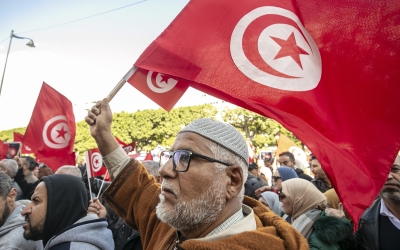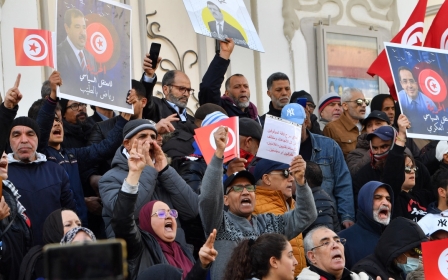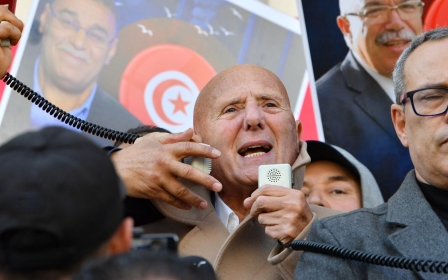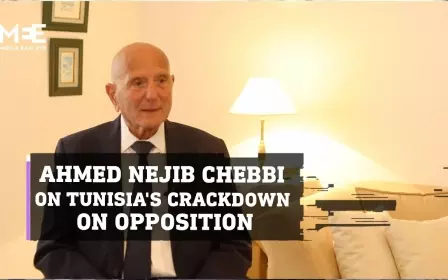Tunisia's President Saied says he's not racist because he has African friends
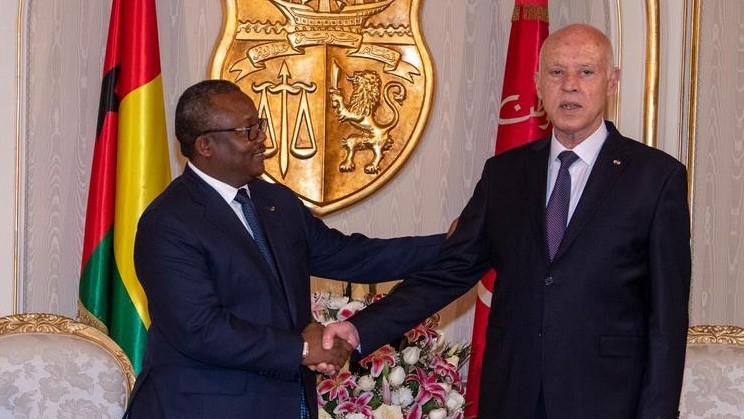
Tunisian President Kais Saied hit back at critics over racially charged remarks he made earlier towards black people by insisting he has African friends.
Standing next to the president of Guinea-Bissau, Umaro Sissoco Embalo, on Wednesday, Saied defended his anti-black comments last month, saying that some of his family members were "married to Africans" and that he “had friends from the law school who were Africans”.
Saied’s comments were widely derided and mocked online as a failed attempt to absolve himself of racism accusations.
“The classic 'I have a black friend',” said one social media user, adding that it was a “pathetic attempt to justify the racist and despicable remarks.”
Last month, Saied warned that the migration of black people from Sub-Saharan Africa to the country was part of a “criminal plan” to replace Tunisians and alter the demographic structure of the country.
New MEE newsletter: Jerusalem Dispatch
Sign up to get the latest insights and analysis on Israel-Palestine, alongside Turkey Unpacked and other MEE newsletters
The visit by Sissoco Embalo seemed to provide support to the embattled Saied, with the president of Guinea-Bissaun stating: “I cannot believe that you [Kais Saied] can be xenophobic or racist,” before awkwardly reminding his Tunisian counterpart “you yourself are African”.
Saied denied that he was racist and suggested his comments were taken out of context.
For other social media users, Saied’s defence underlined that the president spoke about the saga as if he’s not African himself.
By speaking about Africans in the third person, other users wondered if Saied was speaking as a European or Australian citizen and not from a country that is part of the African continent.
In recent years, Tunisia has been a key transit hub for people from other African countries crossing the Mediterranean to enter Europe.
Activists and campaigners have long criticised hate speech directed towards African migrants and refugees in the country, including recent social media campaigns urging authorities to stop those attempting to reach Europe.
Growing backlash
In the weeks since Saied made his comments against African migrants there has been a growing backlash from international organisations.
The African Union said in a statement it “strongly condemns the racial statements on fellow Africans in Tunisia”, without directly referring to Saied.
The chairperson of the African Union Commission, Moussa Faki Mahamat, added that it “strongly condemns the shocking statement issued by Tunisian authorities targeting fellow Africans, which goes against the letter and spirit of our Organisation and founding principles”.
The World Bank suspended its work with Tunisia after African migrants were attacked in the country, following Saied’s xenophobic speech.
The bank's outgoing president, David Malpass, said Saied's tirade had triggered "racially motivated harassment and even violence" and that the institution had postponed a planned meeting with Tunisia until further notice while it assesses the situation, AFP reported.
The US also weighed on Saied's comments.
“As you heard from the World Bank we too are deeply concerned by President Saied's remarks regarding migration from sub-Saharan Africa to Tunisia and reports of arbitrary arrests of migrants in recent weeks," US State Department spokesperson Ned Price said.
"We urge Tunisian authorities to meet their obligations under international law to protect the rights of refugees, asylum seekers and migrants," he added.
Tunisia has been engulfed in a political crisis since July 2021, when Saied unilaterally suspended parliament and dissolved the government in what many have called a "constitutional coup".
He subsequently ruled by decree, before pushing through a new constitution that enshrined his one-man rule.
Middle East Eye delivers independent and unrivalled coverage and analysis of the Middle East, North Africa and beyond. To learn more about republishing this content and the associated fees, please fill out this form. More about MEE can be found here.


